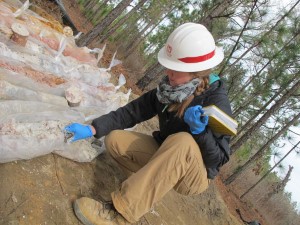Geoscientists, Except Hydrologists and Geographers

Geoscientists study the Earth’s composition, structure, and processes to
understand its history and behavior. They may specialize in areas such
as geology, oceanography, or environmental science. Their work typically
involves conducting field research, sometimes in remote settings.
Geoscientists are often involved in:
-
Conducting surveys and collecting samples from the Earth’s surface
or below ground to study rocks, soil, water, and other natural
materials.
-
Using tools such as geophysical instruments, GPS technology, remote
sensing, and computer models to measure and map features of the
Earth, analyze data, and create charts and graphs that illustrate
their findings.
-
Conducting laboratory tests on samples to determine their
composition, age, and other properties.
-
Collaborating with other scientists and engineers to solve problems
related to environmental hazards, natural resource management, or
public health.
-
Preparing reports and presentations to communicate your findings to
others, including government officials, business leaders, and the
general public.
Read more about this occupation on O*NET OnLine at www.onetonline.org/link/summary/19-2042.00
Explore related careers